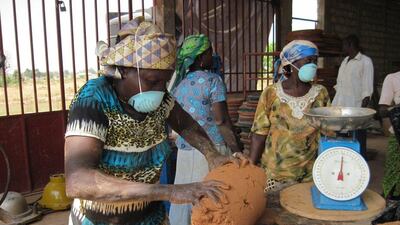DUBAI // The UAE's Expo Live initiative tackles one of the most important challenges facing the world – the need for clean water.
This is according to a pioneer in the field, whose water-filtering technology is being supported as part of the initiative to aid needy communities in the developing world.
Susan Murcott, a senior lecturer at the prestigious Massachusetts Institute of Technology, worked with African villagers and partners such as MIT to develop clay pots reinforced with water-filtering properties.
It is hoped her non-profit group, Pure Home Water, can use its technology wherever there are problems with finding safe, clean drinking water.
“Historically, Expos or world fairs have presented innovations in different countries around the world,” said Ms Murcott, who visited Dubai last month to present her work at the theme symposium before delegates of the Bureau International des Expositions.
“The Dubai Expo is supporting living projects and helping them realise their goals by 2020 and beyond. It will take small start-up projects that are innovative and highlight these.
“The projects are already international in scope but are small and deserved to be scaled up. My work is a kind of complement to their [Dubai Expo 2020] work.”
The seven-year Expo Live programme aims to reach out to deserving communities in the developing world by backing projects such as Pure Home Water and d.light solar-powered LED lanterns. Both received backing of €100 million from the Expo Partnership Fund.
In Tamale, Ghana, the AfriClay filter – a ceramic pot with a water filter made by local people using local materials such as clay and rice husks – has already reached 110,000 people since first orders were received last year.
Ms Murcott, who works with MIT’s department of civil and environmental engineering, said the goal was to make safe drinking water available to the people of northern Ghana and for the ceramic water-filter factory to become financially self-sustaining.
“We contacted village chiefs and then met villagers and did demonstrations and training sessions before taking orders for the filters,” she said.
Each filter comes with a bucket, lid, a tap and has detailed pictorial instructions. The filter is designed to rest directly on the bucket’s rim.
The company also carries out regular microbiological water quality tests. Field staff are trained to ensure filters are packaged correctly to prevent breakages, to ensure safe delivery and to test the filter when it reaches a home.
Contaminated water is one of the main causes of diarrhoea-related diseases that kill more than 760,000 children under 5 each year globally, according to the World Health Organisation.
Videos showing Ghanaian women balancing the filters on their head as they cradle their children were displayed during last month’s theme symposium in Dubai.
The powerful video presentation raised critical points to delegates, such as a billion people lacking clean water and 2.5 billion people lacking basic sanitation.
“The Expo 2020 is a very big event, so showcasing the importance of water sanitation at an expo is very important,” Ms Murcott said.
“I love Dubai’s theme. My first impression is that it is a major centre of the world with an incredible diversity of people who have these big ideas about making the world a better place.
“Dubai’s bid seems to have been well received and November 27 will be the true test.”
UAE officials have said the programme showed the country’s resolve to engage with international and local experts to address critical issues.
The Expo Live initiative was described as innovative by Vicente Gonzalez Loscertales, secretary general of the Bureau International des Expositions, while speaking at the theme symposium.
He praised Expo Live for choosing projects that would bring together people to figure out solutions to the world’s pressing problems.
The final vote to decide the host country will be on Wednesday at the BIE general assembly in Paris.
rtalwar@thenational.ae


